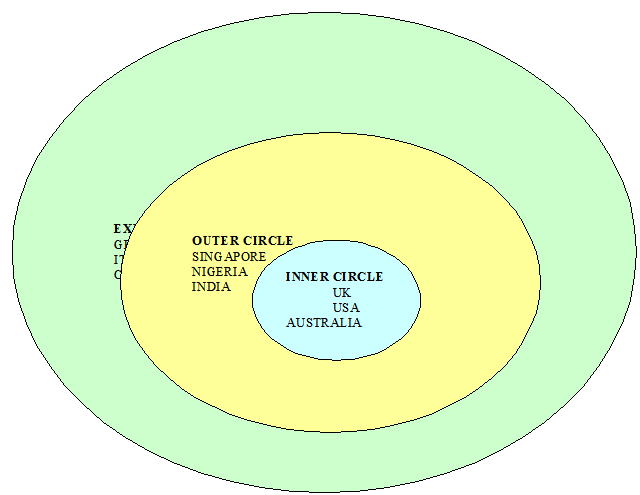
Roberta Zoppo, English II LM Task 2 April, 3, 2009
Which Englishes have a “norm-providing” status?
An imaginary student’s answer.
Most people consider the English language to be a single thing but in reality it is many things, many Englishes. This is because there is no single variety that is both rooted in a geopolitical community and used as a universal standard. Thus, "English" is a fiction; only "Englishes" exist. Of all the Englishes born in Britain and in her former colonies, some have conserved Anglo cultural values and, in their respective communities, constitute the prestige models: General American, Cultivated Australian, R.P. English, etc. They are what Kachru calls the "norm providers". Others, especially those that use English words to express local cultural values (Indian, Singaporean, Philippine, Nigerian Englishes for example), have traditionally taken their linguistic norms from the first group, although lately they have started to become "norm developing" and many people already call them "New Englishes"
My answer.
General American, Cultivated Australian and R.P. English have a norm-providing status. All thoese varieties have developed and codified their own prestige models.
Kachru (1986, 2006) shares out distributes the English varieties of English in three circles: the inner circle, the outer circle and the expanding circle.
The countries mentioned above belong to the inner circle and have English as their first language. Thoese varieties are however also known as Old English or Anglo English. [Note that the term “Anglo English” is not usual and, while you use it to mean Anglo-culture-inspired Englishes, it usually = SBE: http://www.cup.cam.ac.uk/catalogue/catalogue.asp?isbn=9780521852999&ss=exc]
Besides them, the countries of the outer circle (India, Singapore, Nigeria) have a norm-developing status because they have not yet developed their own prestige models. Generally speaking, they are called New Englishes. McArthur (1992) defines them as autonomous varieties spoken as an official language in the ex-British colonies. Sometimes it [? antecedent! They = The New Englishes? Or what?] is referred to the varieties of English spoken outside the British Isles.
Finally, the expanding circle counts in consists of the countries of the rest of the world (Italy, Germany, China) where English is spoken as a foreign language (or lingua franca) for limited purposes like economy. Consequently, they [? antecedent! They = Purposes? Countries?? Expanding Circle Englishes???] have a norm-dependent status.
The following scheme sums up Kachru’s view:

References.
http://en.wikipedia.org/wiki/New_Englishes
http://en.wikipedia.org/wiki/Braj_Kachru
Academic research based on – hem , hem – Wikipedia is like taking medicine recommended by your barber and not by your doctor.
Your essay, while short, is very well written.